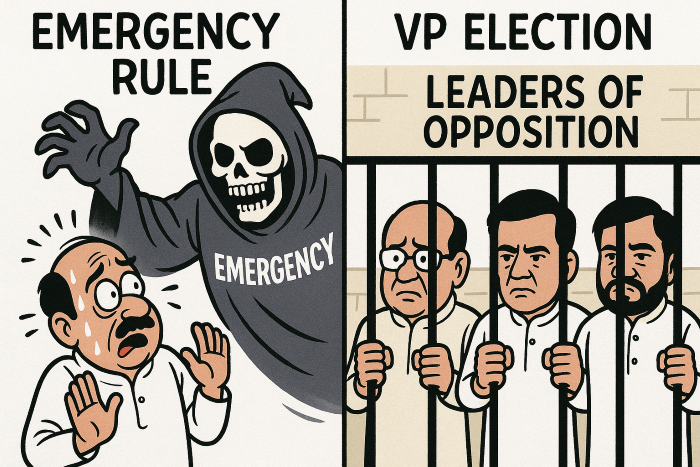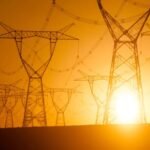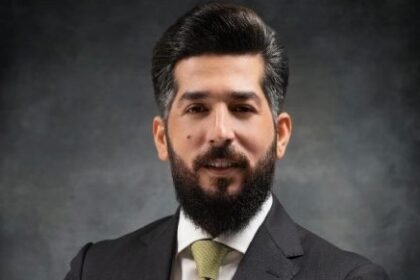
BY MOHAMMAD TARIQUE SALEEM
Historically, India has seen emergency rule before. Indira Gandhi’s 1975 Emergency, invoked under Article 352 of the Constitution citing “internal disturbance,” led to the suspension of civil liberties, press censorship, and the arrest of thousands of opposition figures. Modi and Shah, often accused by critics of authoritarian tendencies, might view cross-voting as a similar existential threat. With the BJP’s dominance in both houses of Parliament, they could swiftly declare an emergency, justifying it as necessary to maintain “national security” amid perceived instability.
In the volatile arena of Indian politics, where alliances shift like sand dunes, a startling speculation has emerged on , September 9, 2025. What if cross-voting by Bharatiya Janata Party (BJP) Members of Parliament (MPs) and their allies derails the election for India’s Vice President? Could this lead Prime Minister Narendra Modi and Home Minister Amit Shah to impose a national emergency, culminating in the mass incarceration of opposition leaders?
While purely hypothetical, this scenario draws from historical precedents and current tensions, painting a dystopian picture of democratic backsliding. The Vice Presidential election, typically a rubber-stamp affair given the ruling coalition’s numerical strength, is meant to be a formality. The position, currently held by Jagdeep Dhankhar, whose term ends in 2027, isn’t up for grabs today, but let’s indulge the “what if.”
Imagine dissent within the National Democratic Alliance (NDA). BJP MPs, perhaps disillusioned by internal power struggles or regional pressures, cross-vote in favor of an opposition candidate. Allies like the Telugu Desam Party or Janata Dal (United) might follow suit, fracturing the coalition’s unity. Such a betrayal could humiliate the Modi-Shah duo, exposing cracks in their ironclad control.
Historically, India has seen emergency rule before. Indira Gandhi’s 1975 Emergency, invoked under Article 352 of the Constitution citing “internal disturbance,” led to the suspension of civil liberties, press censorship, and the arrest of thousands of opposition figures. Modi and Shah, often accused by critics of authoritarian tendencies, might view cross-voting as a similar existential threat. With the BJP’s dominance in both houses of Parliament, they could swiftly declare an emergency, justifying it as necessary to maintain “national security” amid perceived instability.
In this speculative chain of events, the immediate fallout would be swift and severe. Opposition leaders, Rahul Gandhi of the Congress, Mamata Banerjee of Trinamool Congress, Arvind Kejriwal of Aam Aadmi Party, and others, could find themselves behind bars on trumped-up charges of sedition or inciting unrest. Preventive detentions under laws like the Unlawful Activities (Prevention) Act (UAPA) would silence dissent.
The government might argue that cross-voting signals a broader conspiracy, perhaps backed by foreign influences, to destabilize India. Media outlets critical of the regime could face blackouts, social media curbs, and a surge in “fake news” crackdowns. Economically, markets might plummet as investor confidence wanes. International backlash from bodies like the UN or EU could follow, labeling it a “democratic coup.” Yet, Modi’s base, galvanized by nationalist rhetoric, might rally around him, viewing the emergency as a bold move against “anti-national” elements.
Shah, the master strategist, would orchestrate the logistics: deploying paramilitary forces, sealing borders, and monitoring communications via tools like Pegasus spyware. Critics argue this speculation isn’t far-fetched. The BJP’s handling of protests, like the farmers’ agitation or CAA-NRC demonstrations, shows a willingness to use force. Recent judicial appointments and electoral bond controversies hint at institutional capture. If cross-voting occurs, it could be the tipping point, eroding the facade of coalition politics.
However, optimists counter that India’s democracy is resilient. The Supreme Court, civil society, and global scrutiny might prevent such extremes. Cross-voting could instead force negotiations, strengthening federalism. This doomsday scenario underscores the fragility of power in a multipolar India. While unlikely today, it serves as a cautionary tale: democracy thrives on loyalty, but survives through checks and balances. If Modi and Shah opt for emergency, it wouldn’t just jail opponents, it could imprison the nation’s spirit.










